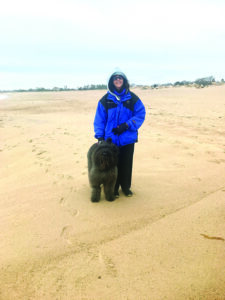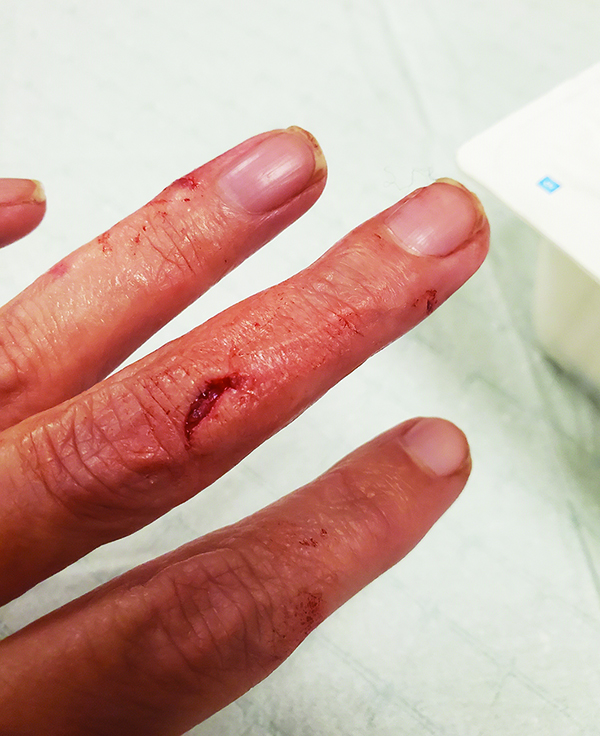When he got bitten by a dog who had jumped out of a car in a shopping plaza parking lot, at least family medicine physician David Wolpaw didn’t have to go to a hospital for treatment. After calling the police so they could locate the owner and take a report, Dr. Wolpaw tended to the bite himself at his office in Manchester, Connecticut.
Few of us are lucky or confident enough to be able to provide our own emergency medical care in the case of a serious dog bite. But thanks to his education and experience treating other dog-bite victims, Dr. Wolpaw knew what to do – and not just in regard to the wound itself. He knew it was also important to report the bite to the proper authorities.
WHAT TO DO IMMEDIATELY AFTER A DOG BITE
There are two things to do right away should you get bitten by a dog: contact the proper authorities and get medical attention for the bite. Dog bites can cause a puncture, scratch, or laceration. In addition, there may be bruising from the force of the bite.
With any luck, the dog’s owner is present and cooperative. In the best of worlds, you will be able to get the dog owner’s name, address, phone number, information about the dog (name, age, breed or breed-mix, and veterinarian’s name). If the dog happens to be wearing a license and/or rabies tag, you can photograph these for a quick way to get this information.
However, you may have to be quick. It’s all too common today for people to try to avoid responsibility or consequences in the case of a mishap. Though you are likely to be shocked and upset in the aftermath of a bite, if it looks like the dog’s owner might try to flee with the dog, be ready to take photos or video of the dog, the owner, any of the owner’s companions who were present, and the owner’s car. If it’s possible, ask your companion or any willing bystanders if they can call the police while you are taking pictures or vice versa.
There are several reasons you need information about the dog and owner. The first has to do with rabies.
In the United States, it’s very unlikely for a dog to transmit rabies to a human, but there are mandatory reporting and quarantine requirements for dog bites in most jurisdictions. These public-health laws trace back to a time when rabies vaccination was less common; if an unvaccinated dog (or a stray dog without identification) bit someone, and the dog showed signs of illness during a quarantine period, the person would be advised to receive post-exposure prophylaxis (PEP) – injections of human rabies immune globulin and rabies vaccine.
If the dog’s vaccination can be verified and he displays no sign of illness during his quarantine, the bite victim won’t need PEP.
If the owner is being antagonistic, don’t hesitate to call police and/or animal control for assistance. Public safety officers will also be needed if the dog who bit you seemed to be a stray, with no owner in sight. Do not try to chase or capture the dog, but photograph the dog if you possibly can; photos can help animal-control officers identify the dog.
SEE: WHAT TO DO IF YOUR DOG BITES SOMEONE
According to the United States Centers for Disease Control and Prevention, there are about 4.5 million dog bites in the U.S. per year, with about 18% (800,000) of those serious enough to require medical attention.
Children are the most common victim of dog bites and are more likely than adults to be severely injured by a bite. Bites to the head, neck, or face represent about half of the cases that require medical intervention.
Benjamin Phillips, MD, MPH, of Wakefield, Rhode Island, a board-certified plastic surgeon with a sub-specialization in hand and peripheral nerve surgery, describes this statistic as simply a function of proximity of the child’s head to a dog’s face: A child is the “right height,” and they tend to do things like put their faces up close to dogs, hug or try to kiss dogs, or approach dogs as they are eating or are near their food bowls.
In contrast, adults most frequently suffer bites to the body – particularly on the hands or arms – from breaking up dog fights, or simply acting to defend themselves from a dog attack, which children are less able to do.
Dog bites are not just traumatic, their treatment is costly. According to the American Veterinary Medical Association, insurance companies paid out $854 million in liability claims related to dog bites and dog-related injuries in 2020 alone. And the average cost of a dog-bite insurance claim in 2020 was $50,245.
WHAT TO DO WHEN A DOG BITES YOU: SEEKING MEDICAL ATTENTION
Though it may sound a little mercenary, before the wound is cleaned or treated, take pictures of your injuries. Continue to document the bite wound and any other bruises or abrasions you may have received. This evidence might be needed in case of any litigation – or to help prove the extent of the injury to the dog owner’s insurance company.
Assuming you’re not in need of an ambulance, the next step is deciding whether you are capable of dealing with the wound yourself or if you need to get to an emergency room.
Facial wounds require immediate emergency medical treatment for both cosmetic reasons and high risk of infection. For other wounds, both Drs. Phillips and Wolpaw advocate cleansing the wound with warm, soapy water for 10 to 15 minutes thoroughly to flush out any debris or foreign bacteria. If the wound is bleeding, Dr. Phillips advises elevation first – particularly if the bite is to a hand or arm – and applying pressure to the area for 15 minutes, then washing with warm, soapy water. If the wound continues to bleed, seek professional medical care right away.
If the wound stops bleeding, and you opt not to seek professional medical care, Dr. Phillips advises watching for redness around the wound, especially if the bite is on your hand. If an infection sets in, you may see red streaks running toward your forearm, you may develop a fever, or your hand or fingers may feel numb. All these signs necessitate medical intervention as soon as possible.
Once cleaned, the wound can be covered with a loose bandage, changed multiple times a day as needed. Fluids should be allowed to seep out of the wound. Dr. Phillips is not a proponent of topical ointments because patients tend to overdo it, and the ointment sometimes acts as a stopper, leading to an infection.
For bites other than facial wounds, both doctors agree that it is never a bad idea to be seen by a medical professional right away, or, at most, within 24 hours of the bite. This goes double for people with diabetes or compromised immune systems. Tetanus is a consideration, and while not all dog bites require antibiotics, oral antibiotics may be indicated, or prescribed prophylactically.
Also, if the wound is significant and legal action ensues, you will want to have a record that you sought care. Dr. Wolpaw notes that in case of a lawsuit over the costs of treating the bite, if the victim failed to get immediate medical attention, the defense attorney will surely seek to mitigate her client’s responsibility and suggest that the victim is partly responsible for failing to get prompt care.
There are a number of reasons that some people might be reluctant to report a dog bite.
Some people might be fearful of the potential consequences for the dog. This reluctance might be understandable, especially if the bite was the result of bad timing and/or unlucky circumstances, rather than an owner’s clearly negligent management of a dangerous dog or willful disregard for the safety of others. But as long as the dog had no former bite record, in most cases, the worst thing that the dog might suffer is a quarantine in strict confinement for 10 days, often at home; the dog’s owner may have to pay fines (for an unlicensed dog, a dog at large, or any other applicable violations).
Dogs with more than one public-safety offense may be required to be registered as a “dangerous dog.” Dogs who have been designated as “dangerous” may be allowed in public only when wearing a muzzle, or subjected to other restrictions.
If it turns out that the dog has a history of several previous bites and insufficient management, in our opinion, the report and any potential consequences for the repeat offense are especially necessary. A dog with several serious bites to his credit, in the hands of a person who is incapable or unwilling to provide adequate management and control of the dog, is a deadly threat to the public.
What if the dog who bit you or someone in your family was a friend’s dog? Admittedly, this is a sticky situation. If your relationship is strong and the friend agrees to and is able to take financial responsibility for your medical treatment, you may decide to decline to report the bite – especially if you feel reasonably confident that the dog is not a threat to other people. Understand, though, that this is taking a risk. For example, a dog bite to the hand that gets infected can cause nerve damage that would preclude a person from being able to use that hand for certain tasks (playing guitar, say) or occupations. Lacking any official report or record of the bite, it’s unlikely you could get your friend’s insurance company to cover your extensive medical costs.
However, you may not have a choice in the matter, since in most states, medical providers are required by law to report dog bites to local animal-control officials. Their mandatory reporting may save you from having to make a socially uncomfortable choice.
UNSEEN WOUNDS WHEN A DOG BITES YOU

Dr. Phillips says he has seen some “gruesome stuff,” but he is quick to acknowledge that the emotional component associated with dog bites is sometimes worse than the physical ones – at least the physical wounds usually heal more quickly than the emotional ones. It may take some time before the victim realizes that they experienced a traumatic event. Dr. Phillips says he has had patients develop crippling anxiety after being bitten – severe-enough anxiety that they required a referral to a mental-health provider.
My own sister was bitten by a dog while on a walk, and years later, still feels highly anxious when approached by off-leash dogs. Fortunately, she is comfortable with my dog, and she has learned to “be a tree” and avoid eye contact if an unfamiliar dog approaches her during beach walks.
Dr. Wolpaw believes that emotional fallout is another reason to seek medical care right away. He has seen cases of people dealing with post traumatic stress disorder (PTSD) that required treatment; credible medical documentation is helpful should liability issues arise.
His final advice: Keep good records and take care of your medical issues, especially if the dog is not known to you. “You shouldn’t minimize the situation because there could be problems down the road. Better safe than sorry,” he says.
According to the Insurance Information Institute (III), a homeowner’s or renter’s insurance policy will typically cover dog-bite-liability expenses, unless the claim exceeds the policy’s liability limits (usually $100,000 to $300,000) – or unless you’re one of the unlucky ones whose insurance company doesn’t cover dog-bite claims.
It pays to know what you have for coverage. Los Angeles-based attorney Kenneth M. Phillips, owner of DogBiteLaw.com, recommends that dog owners have coverage of at least $100,000 for liability plus $1,000 for no-fault medical payments, although he prefers at least $300,000 plus $5,000. Getting this coverage may require a primary policy (homeowner’s, renter’s, or a specific canine liability policy), and a secondary policy (umbrella or excess policy).
A “canine liability policy” is an option if you’re unable to get a homeowner’s or renter’s policy because you have a dog or a certain breed of dog, your insurer doesn’t cover dog bites, or if your umbrella policy doesn’t cover dog bites. At least two states (Pennsylvania and Michigan) have laws prohibiting insurers from canceling or denying coverage to the owners of certain breeds of dogs, while some states allow coverage exclusions after a dog bites.
Phillips recommends that you speak with your agent about what your policy specifically covers and what it excludes. He also advises that you review the language in your policy to understand whether dog bites are excluded; look for the “Personal Liability” section and review the policy exclusions. The declarations section will show the limit of the policy.
Pay attention to updates and notices from your insurance company – “riders” or policy amendments – as they may declare coverage changes.
State legislation varies widely in terms of liability if your dog causes injury – whether from a bite or other incident (i.e., knocking down an elderly person, chasing someone into traffic). According to the III, as of March 2021, 29 states have strict liability dog-bite statutes in which the dog owner is held liable for any injury or property damage that the dog causes, although some states have exceptions, such as if the dog was provoked or the victim was trespassing. In 17 states and the District of Columbia, the III states, “Liability is not automatically granted but attacks are classified as misdemeanors or, in extreme cases, as felonies, with fines,” and four states have no dog-bite laws. On top of that, local ordinances can add another layer of complexity.







I was bitten by a dog (poodle) a few years ago. I walk and train and I knew the dog and he’s always good with me and excited to see me. It was rare I had to put him in his crate, but the owners had cleaning people coming. The dog grabbed something and ran into the crate. I wanted to make sure it was something he could have, so I reached in to grab it and he bit me . They never told me he was possessive of things, so I never noticed this behavior before. I took pics, cleaned it up and went on with my day. Later, my entire hand swelled up and I was intense pain, but still have several places to go, yet! Finally, went to the hospital at night. Stayed over two days. Just needed some intense antibiotics, but they were afraid the bite hit a mail vein, so I had that checked as well. Took a few months before I could make a fist with all my fingers. Lesson learned? Get medical help as soon as you get bitten!
My dog was attacked by a dog 6 weeks ago when we were just a few houses away from home. It had apparently gotten out while visiting in the neighborhood. It had no collar and locked it’s jaws onto my 30 # dog’s throat, before jumping to other places on his body. I’ll spare the details, but I don’t think my dog can ever emotionally return to the therapy dog work that he seemed to enjoy with me and I had to have hand surgery–including pinning of a fractured finger at the joint line. I’m a physical therapist and haven’t been able to work since then.
This is a well-written article. I am focusing on getting hand function back, but agree that the mental aspect of this has scarred me much more deeply. To add insult to injury, the home owners insurance of the dogs owner say their policy excludes certain dog breeds. The dog was NOT up-to-date on rabies, but at least passed quarantine, so I didn’t have to get the prophylactic shots. I’m thankful for that.
As a delivery driver for a well-known nationwide Take-Away delivery service, I was walking out from a drop-off when a dog bit the back of my thigh out of nowhere! I never heard it coming, it was not wearing a collar or harness, and it had no leash trailing behind it. A person yelled, ‘Hey, hey, hey!’ immediately after the dog bit, and this motivated me to repeat the same words loudly, ‘Hey, hey, hey !’ which at least appeared to break the dog’s train of thought as it circled in front of me and headed back towards me! The owner was not wearing any shoes as far as I could see, so… were they about to walk this dog barefoot or what?!? Was I just a big “Toy” of unknown composition and scent for “it” to play with? Was biting a ‘black object’ (I was wearing black denim jeans) that smelled like another dog (yes, I own a dog too) simply its way of ‘Playing’ or saying, ‘Hi! ~ How are ya?’ … because if so, that does not sound like a good housedog behavior to continue allowing! In my encounter, since I did not feel any blood on the back of my leg and still had several hours of productive time available that evening, I made for my vehicle and drove away without getting the owner’s name, this turns out to be a mistake and complicates any claim of liability afterwards. I observed the dog STILL running around the apartment complex with the ‘Owner’ presumably somewhere behind it as I drove away.
In follow-up the next day, my Primary Care M.D. recommended visiting an Urgent Care provider but, two of the local ones I called did not treat dog bites. I next called my insurance company’s Ask a Nurse advice line and after at least a dozen questions, the advice given was to be seen at an Emergency Department, which I did. Two vaccine shots and several vials of immune boosting serum later, I was ready to be “Done” with the whole business!